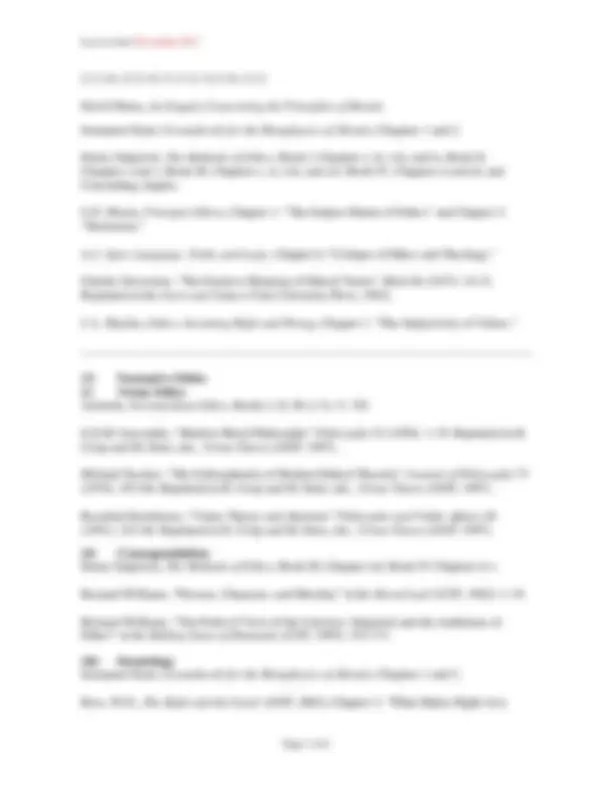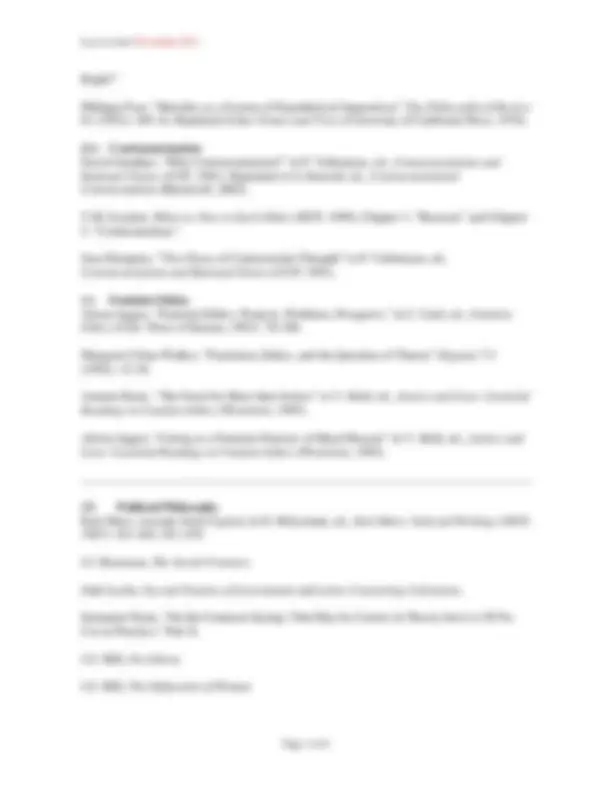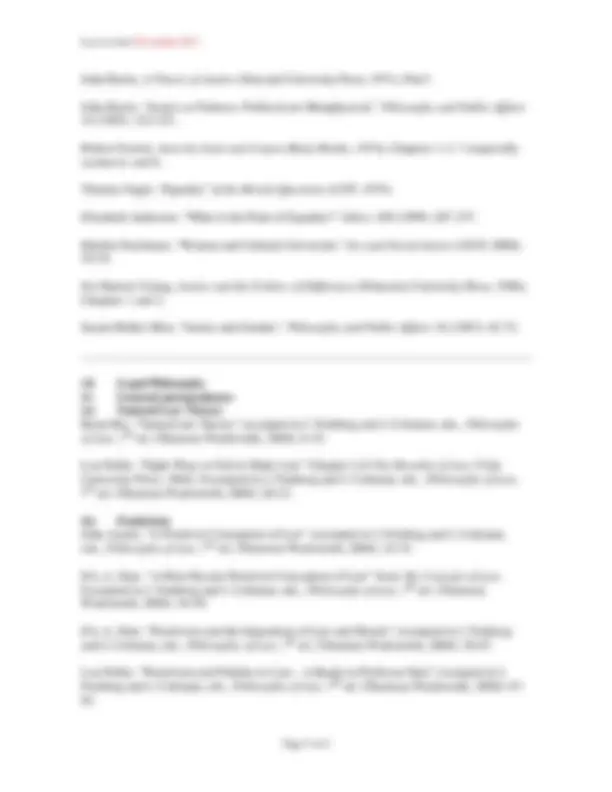





Study with the several resources on Docsity

Earn points by helping other students or get them with a premium plan


Prepare for your exams
Study with the several resources on Docsity

Earn points to download
Earn points by helping other students or get them with a premium plan
Community
Ask the community for help and clear up your study doubts
Discover the best universities in your country according to Docsity users
Free resources
Download our free guides on studying techniques, anxiety management strategies, and thesis advice from Docsity tutors
Instructions and a reading list for the Moral, Political, and Legal Philosophy Comprehensive Exam offered by the University of Western Ontario. The exam tests candidates' knowledge of historical and contemporary readings in moral, political, and legal philosophy, and related matters. The exam is composed of four sections: History of Ethics, Normative Ethics, Political Philosophy, and Legal Philosophy. Candidates are required to answer four questions, two from Section (1) and two from any other section(s) of their choice. The document also provides grading procedures and expectations for the exam.
Typology: Lecture notes
1 / 6

This page cannot be seen from the preview
Don't miss anything!




(a) Content The Moral, Political, and Legal Philosophy Comprehensive Exam (the “MPL Comp”) is offered four times a year, in January, April, August, and October. Candidates are expected to demonstrate familiarity with historical and contemporary readings in moral, political, and legal philosophy, and with relevantly related matters. The MPL Comp is composed of four sections: Section (1) – History of Ethics; Section (2) – Normative Ethics; Section (3) – Political Philosophy; and Section (4) – Legal philosophy. The exam will offer a choice of questions pertaining to material included in those four sections.
(b) Requirements Since the MPL Comp is designed to test comprehensive knowledge, candidates are expected to provide critical responses to questions that show that they understand what the questions are asking and what underlying issues are being raised. Candidates writing the MPL Comp will be required to answer four questions: two questions from Section (1): History of Ethics; and two additional questions from any other section(s) of the candidate’s choice. So, for example, a candidate could pass the MPL Comp by successfully answering two questions from Section (1) – History of Ethics, one question from Section (2) – Normative Ethics, and one question from Section (3) – Political Philosophy. Alternatively, a candidate could pass the MPL Comp by successfully answering two questions from Section (1) – History of Ethics, and two questions from Section (4) – Legal Philosophy. Each section of the MPL Comp will contain four questions, for a total of 16 questions.
(c) Grading Procedure Exams will be graded by all members of the MPL Area Committee. For a candidate to pass the exam, s/he must receive a passing grade on all four questions.
(d) Exam Writing Options Candidates can satisfy the MPL Comp requirement in one of two ways.
been submitted and will ask the candidate questions about his/her written exam. This oral component, or viva , will be approximately 30 minutes in duration. The panel will have the authority to determine whether the exam, taken as a whole, constitutes a pass. A simple majority of the committee will be sufficient. The candidate will be informed of the decision of the committee at the conclusion of the viva.
(e) Expectations 4 hour Sit-down Version It is expected that students writing the 4 hour sit-down version of the MPL Comp will write 1.5 to 2 single-spaced pages per answer (approximately 750-1000 words). A good answer should have a thesis, an introduction, a main body, and a conclusion, and will clearly and directly address the question(s) asked. While there is no expectation that students will quote directly from either primary or secondary materials, students are expected to demonstrate familiarity with both.
24 hour Take-home Version It is expected that students writing the 24 hour take-home version of the MPL Comp will write 3 to 4 single-spaced pages per answer (approximately 1500-2000 words). A good answer will have a thesis, an introduction, a main body, and a conclusion, and will clearly and directly address the question(s) asked. It is expected that the resulting answers will demonstrate substantial scholarly engagement with the primary sources on which the questions are based, and will reflect significant familiarity with relevant secondary materials. Students are strongly encouraged to support their arguments with direct quotes from primary sources, and to include quotes from and/or make direct references to secondary materials as well. Students are required to provide references for all sources in footnotes, endnotes, or a bibliography.
(f) Time Line Candidates should inform the Graduate Assistant and the Chair of the MPL field of their intention to write the Comp at least one month prior to their intended writing date, and should also indicate which version of the MPL Comp – the four-hour sit-down or twenty- four hour take-home – they intend to write. Any additional questions or concerns about the MPL Comp should be directed to the Graduate Assistant or the Chair of the MPL Field.
(1) History of Ethics Plato, Protagoras , 309a-314c, 328d-333c, 349b-362a
Plato, Republic , Book I, 327a-354c; Book II, 357a-367e; Book IV 427d-445e; Book IX 576b-592b
Aristotle, Nicomachean Ethics , Books I, II, III (1-5), V, VII
Thomas Hobbes, Leviathan, Chapters 6, 10-21, 26-
David Hume, A Treatise of Human Nature, 1.1.1-4; 1.3.1-2,14; Books II and III, especially
Right?”
Philippa Foot, “Morality as a System of Hypothetical Imperatives” The Philosophical Review 81 (1952): 305-16. Reprinted in her Virtues and Vices (University of California Press, 1978).
(iv) Contractarianism David Gauthier, “Why Contractarianism?” in P. Vallentyne, ed., Contractarianism and Rational Choice (CUP, 1991). Reprinted in S. Darwall, ed., Contractarianism/ Contractualism (Blackwell, 2003).
T.M. Scanlon, What we Owe to Each Other (HUP, 1999), Chapter 1: “Reasons” and Chapter 5: “Contractualism.”
Jean Hampton, “Two Faces of Contractarian Thought” in P. Vallentyne, ed., Contractarianism and Rational Choice (CUP, 1991).
(v) Feminist Ethics Alison Jaggar, “Feminist Ethics: Projects, Problems, Prospects,” in C. Card, ed., Feminist Ethics (Univ. Press of Kansas, 1991): 78-106.
Margaret Urban Walker, “Feminism, Ethics, and the Question of Theory” Hypatia 7: (1992): 23-38.
Annette Baier, “The Need for More than Justice” in V. Held, ed., Justice and Care: Essential Readings in Feminist Ethics (Westview, 1995).
Alison Jaggar, “Caring as a Feminist Practice of Moral Reason” in V. Held, ed., Justice and Care: Essential Readings in Feminist Ethics (Westview, 1995).
(3) Political Philosophy Karl Marx, excerpts from Capital , in D. McLennan, ed., Karl Marx: Selected Writings (OUP, 1987): 421-443, 451-470.
J.J. Rousseau, The Social Contract.
John Locke, Second Treatise of Government and Letter Concerning Toleration.
Immanuel Kant, “On the Common Saying: That May be Correct in Theory but it is Of No Use in Practice,” Part II.
J.S. Mill, On Liberty
J.S. Mill, The Subjection of Women
John Rawls, A Theory of Justice (Harvard University Press, 1971), Part I
John Rawls, “Justice as Fairness: Political not Metaphysical,” Philosophy and Public Affairs 14 (1985): 223-251.
Robert Nozick, Anarchy State and Utopia (Basic Books, 1974), Chapters 1-3, 7 (especially section I), and 8.
Thomas Nagel, “Equality” in his Mortal Questions (CUP, 1979).
Elizabeth Anderson, “What Is the Point of Equality?” Ethics 109 (1999): 287-337.
Martha Nussbaum, “Women and Cultural Universals,” Sex and Social Justice (OUP, 2000): 29-54.
Iris Marion Young, Justice and the Politics of Difference (Princeton University Press, 1990), Chapters 1 and 2.
Susan Moller Okin, “Justice and Gender,” Philosophy and Public Affairs 16 (1987): 42-72.
(4) Legal Philosophy (i) General jurisprudence (a) Natural Law Theory Brian Bix, “Natural law Theory” excerpted in J. Feinberg and J. Coleman, eds., Philosophy of Law , 7th^ ed. (Thomson Wadsworth, 2004): 8-19.
Lon Fuller, “Eight Ways to Fail to Make Law” Chapter 2 of The Morality of Law (Yale University Press, 1964). Excerpted in J. Feinberg and J. Coleman, eds., Philosophy of Law , 7 th^ ed. (Thomson Wadsworth, 2004): 20-23.
(b) Positivism John Austin, “A Positivist Conception of Law” excerpted in J. Feinberg and J. Coleman, eds., Philosophy of Law , 7th^ ed. (Thomson Wadsworth, 2004): 24-35.
H.L.A. Hart, “A More Recent Positivist Conception of Law” from The Concept of Law. Excerpted in J. Feinberg and J. Coleman, eds., Philosophy of Law , 7th^ ed. (Thomson Wadsworth, 2004): 36-50.
H.L.A. Hart, “Positivism and the Separation of Law and Morals” excerpted in J. Feinberg and J. Coleman, eds., Philosophy of Law , 7 th^ ed. (Thomson Wadsworth, 2004): 50-67.
Lon Fuller, “Positivism and Fidelity to Law—A Reply to Professor Hart” excerpted in J. Feinberg and J. Coleman, eds., Philosophy of Law , 7 th^ ed. (Thomson Wadsworth, 2004): 67-